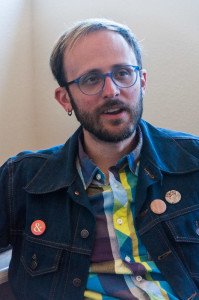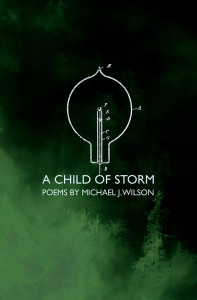Tags
Related Posts
Share This
Of Tesla, Time & Space

Poet Michael Wilson, author of ‘A Child of Storm’. Photo by Sasha Hill
A man of serendipitous luck, Michael J. Wilson’s third year of teaching at SFUAD also marks the publication of his first poetry collection A Child Of Storm. Born in England, Wilson spent his childhood moving from place to place. Along with his time at the New School in New York City, these experiences shaped the poems that would eventually constitute his first book, solidifying an already-present fascination with the life of Nikola Tesla and shifting his focus to the way people relate to each other. With only days left until the book release, Wilson spoke with Jackalope Magazine about his writing process and the themes of his poetry.
Jackalope Magazine: How does teaching affect or influence your writing?
Michael J. Wilson: I find that the hardest thing about not being in school, not thinking about a day-to-day art form, has been [actually writing]. When you’re in school, you have deadlines, you have friends who are working on art, you have that peer pressure to be creative and awesome. I find it really terrifying that at some point I could just stop doing this, and it would be OK. Being around the students, you guys are [writing], so it encourages me to get more excited about it. There’s no excuse for me to go home and not write. What’s been nice is having to assign students work; it means ‘OK, I’m telling you to go read and write, now I’m going to go do it, too’… I write a poem every day; I promised myself years ago I would do this, and I’ve done it for years.
Many of these poems focus on Tesla. Did some of these come out of the poem-a-day experience?
The original run of Tesla poems, I wrote one a day…for a whole month. That’s how it started, and it expanded into writing about my ideas on how because of Tesla and Edison’s hatred of Tesla, that’s how we ended up with the electric chair. I tied it into how, culturally, we’ve made Tesla’s dream of a wired America, [of] electricity somehow terrible and dark. We’ve allowed technology to become this thing that controls us, not a tool we use to make ourselves better necessarily. I find Tesla to be the hope of technology.
Do you have any creative rituals or routines?
I go through phases of producing a lot of work, and then phases of producing nothing. It used to scare me; I always thought, ‘This is when I stop writing.’ Then I realized it’s my brain recharging. During the not-writing times, that’s when I edit, that’s when I submit to magazines, that’s when I make a manuscript. It’s also when I read more. I read more when I’m not writing. And part of my process is reading authors I am interested in—absorbing their genres, their tics.
You mentioned that you were feeling uninspired in New York, but many poems in this book are very grounded in New York City, especially in the first half with Nikola Tesla. Did you become aware of Tesla and the city’s history while you were there?
I think I was secretly way more inspired by New York than I say I was. Tesla has always fascinated me. He was a genius [who] never got to realize his full potential because no one would give him money. I’ve always viewed him as the artist in all of us who is never given the chance to become an artist because he had to have a day job or… because he didn’t have access to educational tools. I see him as this great untapped potential, this gigantic what-if.
New York is a place where weird things have always happened. There’s so much history that we don’t even know about because New York constantly remakes itself. There’s no plaque where Tesla’s laboratory used to be on Houston Street, nothing to indicate that Houston was the first street in NYC that was electrically lit. That was where it started, and somewhere along the line, I became obsessed with how America doesn’t have history. I wanted to give New York back to Tesla, in a way. I wanted to give him time and space and place.

Michael J. Wilson’s ‘A Child of Storm’ publishes Oct. 10, 2016. Photo courtesy of Stalking Horse Press.
A lot of these poems seem to anchor on geography—Ground Zero and Houston Street in New York City, Colorado, London, Santa Fe, the Sangre de Cristo mountains, London. What part did travel play in the inspiration of these poems?
Growing up with my dad in the military, I never lived in a house for more than two years. I had lived in 17 houses by the time I was 13 or 14. Until high school, I didn’t have a place, if that makes sense. When people ask me where I’m from, I don’t know how to answer because I don’t have a hometown. For me, place is important because I grew up with the idea that at any moment, picking up and going is not a bad thing. Picking up and going is OK. I grew up with the idea that I never become too tied to a place, so it comes out in my work, where [it] is very concerned with where we are right this second, because right this second is the only certainty.
What was it like to sequence the poems in this book? There’s a progression from the historical and the science to the nature to this sense of memory and personal history toward the end.
I actively decided the book is about the life cycle, from childhood to death, and how as a child, your understanding of death is confusing. I wanted it to be like Tesla as this creative energy starting point, and tie it loosely into poems that are more of a personal ‘I,’ a narrator of some kind. What I tend to do is put them in the order of how I would want them to be as a reader, off of how the last two lines of a poem and first two of the next feel. Nothing bothers me more than when you’re listening to an album of music and the songs don’t flow perfectly. It takes you out.
There’s a theme about man supplanting the old deities and progress and technology and the destruction that may or may not follow that. How do you see this collection resonating with the world today?
I think we’re at a moment where, as a species on a planet in space and time, we have two choices. We either embrace our best selves, save ourselves, or we don’t. We are physically making that choice. That report came out that we just reached the carbon threshold we’re never going to come back from. We’ve reached a point where it’s potentially…impossible to undo without us as a species dying and the earth being left to its own devices. I grew up in the ’80s, and we’ve been talking about global warming for 40, 50 years. This is not a new concept. The problem is, we keep saying we ‘must’ do something, as if it’s tomorrow. We’re having a mañana problem. We keep saying we should do that. We don’t say ‘let’s do it now.’ This isn’t necessarily a doom-and-gloom book, but it has the element of a question—will this destroy us or not? I would like to believe it won’t, but I have no proof. We’re very alienated as people, and I feel like we need to re-find our humanity.
________________
Michael J. Wilson’s A Child of Storm publishes Oct. 10, 2016. A book release party will be held from 7-9 p.m., Wednesday, Oct. 12 at Santa Fe Spirits, 308 Read Street.
This interview has been edited and condensed for clarity.






 Jackalope Magazine is the student magazine of Santa Fe University of Art and Design. Building on the interdisciplinary nature of our education, we aim to showcase the talent of our university and character of our city.
Jackalope Magazine is the student magazine of Santa Fe University of Art and Design. Building on the interdisciplinary nature of our education, we aim to showcase the talent of our university and character of our city.
0 Comments
Trackbacks/Pingbacks